Intro
Master the art of finding the last row in Excel VBA with ease. Learn how to use VBA to dynamically identify the last row with data, including methods for finding the last row in a range, last row in a worksheet, and last row in a table. Discover the power of VBAs.Find,.End, and.SpecialCells methods.
Finding the last row in Excel VBA can be a daunting task, especially for beginners. However, with the right techniques and codes, it can be made easy. In this article, we will explore the different methods to find the last row in Excel VBA and provide you with the necessary codes to make it happen.
Why is finding the last row important?
Finding the last row in Excel VBA is crucial when working with data that is constantly changing. Whether you are dealing with a small dataset or a large one, knowing the last row can help you to:
- Avoid errors when working with data
- Improve the performance of your code
- Make your code more efficient and dynamic
Method 1: Using the Range.Find Method
One of the most common methods to find the last row in Excel VBA is by using the Range.Find method. This method allows you to search for a specific value or string in a range of cells and returns the last cell that contains the value.
Sub FindLastRow()
Dim ws As Worksheet
Set ws = ThisWorkbook.ActiveSheet
Dim lastRow As Long
lastRow = ws.Cells.Find("*", searchorder:=xlByRows, searchdirection:=xlPrevious).Row
MsgBox "The last row is " & lastRow
End Sub
Method 2: Using the Range.End Method
Another method to find the last row in Excel VBA is by using the Range.End method. This method allows you to move to the last cell in a range of cells.
Sub FindLastRow()
Dim ws As Worksheet
Set ws = ThisWorkbook.ActiveSheet
Dim lastRow As Long
lastRow = ws.Cells(ws.Rows.Count, "A").End(xlUp).Row
MsgBox "The last row is " & lastRow
End Sub
Method 3: Using the Range.CurrentRegion Method
The Range.CurrentRegion method is another way to find the last row in Excel VBA. This method returns the range of cells that are bounded by blank rows and columns.
Sub FindLastRow()
Dim ws As Worksheet
Set ws = ThisWorkbook.ActiveSheet
Dim lastRow As Long
lastRow = ws.Range("A1").CurrentRegion.Rows.Count
MsgBox "The last row is " & lastRow
End Sub
Method 4: Using the UsedRange Property
The UsedRange property is a built-in property in Excel VBA that returns the range of cells that are in use.
Sub FindLastRow()
Dim ws As Worksheet
Set ws = ThisWorkbook.ActiveSheet
Dim lastRow As Long
lastRow = ws.UsedRange.Rows.Count
MsgBox "The last row is " & lastRow
End Sub
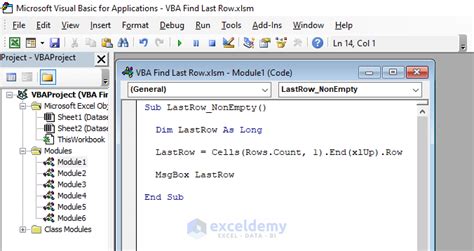
Choosing the right method
Each of the methods above has its own strengths and weaknesses. The Range.Find method is the most flexible, but it can be slow if you are working with large datasets. The Range.End method is faster, but it requires you to specify a starting point. The Range.CurrentRegion method is useful when you are working with tables or ranges of cells that are bounded by blank rows and columns. The UsedRange property is the simplest method, but it can be affected by formatting and other factors.
Best practices
When finding the last row in Excel VBA, it's essential to follow best practices to ensure accuracy and efficiency. Here are some tips to keep in mind:
- Always specify the worksheet object when working with ranges or cells.
- Use the
Longdata type to store the last row number to avoid overflow errors. - Avoid using the
Selectmethod when working with ranges or cells. - Use the
Option Explicitstatement to declare all variables and avoid errors.
Conclusion
Finding the last row in Excel VBA can be a challenging task, but with the right techniques and codes, it can be made easy. By understanding the different methods and best practices, you can write efficient and dynamic code that handles changing data with ease.
What's your favorite method for finding the last row in Excel VBA? Share your experiences and tips in the comments below!
Gallery of Excel VBA Images
Excel VBA Image Gallery
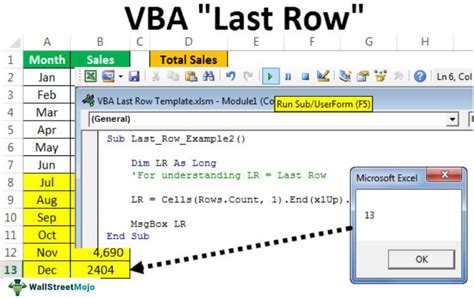
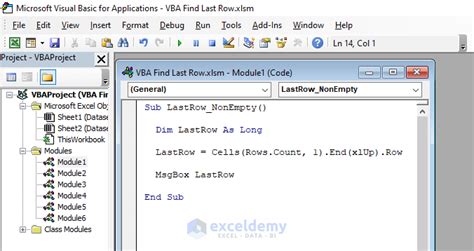
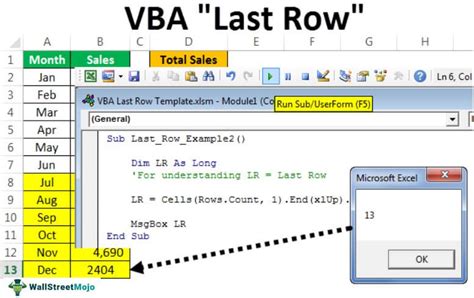
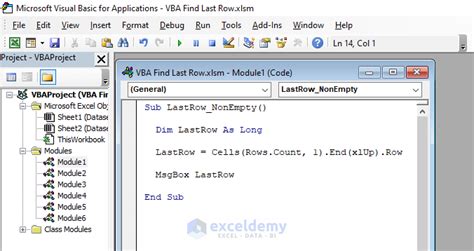
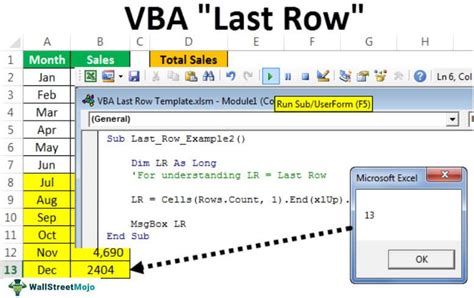
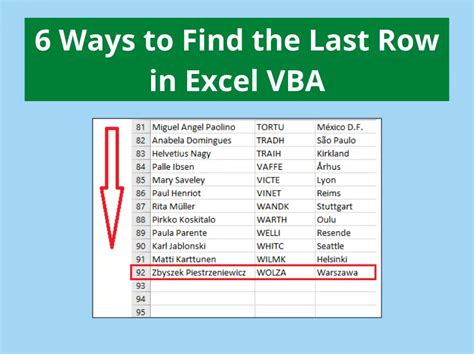
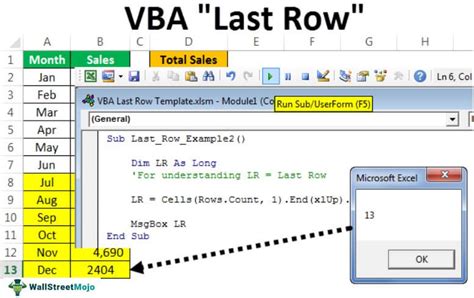
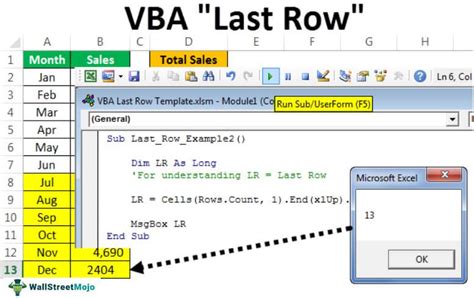
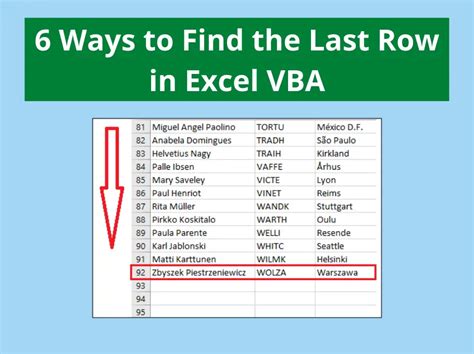
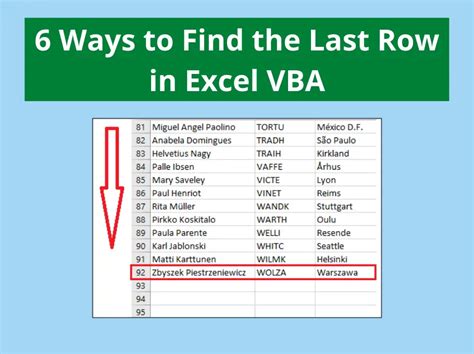
FAQ
- What is the most common method for finding the last row in Excel VBA?
The most common method is using the
Range.Findmethod. - How do I specify the worksheet object in Excel VBA?
You can specify the worksheet object by using the
Setstatement, such asSet ws = ThisWorkbook.ActiveSheet. - What is the best practice for storing the last row number in Excel VBA?
It's best to use the
Longdata type to store the last row number to avoid overflow errors. - Can I use the
Selectmethod when working with ranges or cells in Excel VBA? It's not recommended to use theSelectmethod when working with ranges or cells, as it can slow down your code and cause errors.
